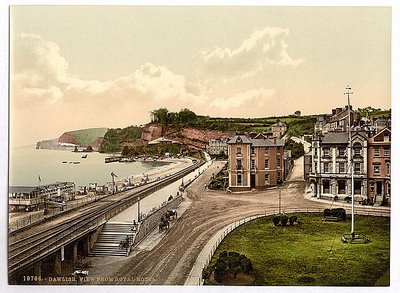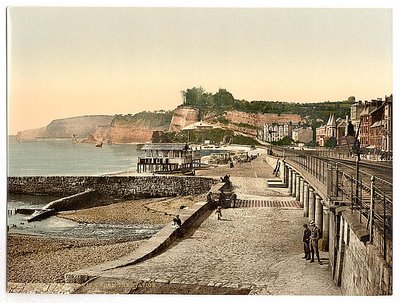Takeaway.

An evening of struggling with Powerpoint has made me dislike that program even more than I did before; everything seemed good until the slideshow that took me three hours to construct suddenly started crashing the program. Repeatedly. Just when I was about to give up and start over, everything started working again, but I don't feel particularly reassured that this mishap won't recur. The whole experience reminds me of the time my first graduate seminar paper somehow got itself corrupted (I swear there was no operator error involved with this file's demise) the morning I was due to leave Ithaca for winter break. Since I had three hours before I had to depart for the airport, I decided that I would simply retype the entire paper--all 28 pages of it. With footnotes. I made it through about 24 before I had to admit defeat and pack all my dirty clothes into a suitcase and all my sleepless, unwashed self into my winter coat for the trip home. At least this evening I can chart how far I've come since those panicky days. On the other hand, this slideshow isn't for a grade; it's for this weekend's reunion of participants in Kenyon's study abroad program at the University of Exeter in southwest England.
I was tossing around plans to write about something else today, but all the effort I've been expending on the 150 images in this slideshow has left me thinking instead about living and traveling in England. It's been an even decade since the end of my stay there; ten years ago today, I was almost certainly doing what the English call "revising," or studying for the exams that made up the bulk of my year's grades. Revising for exams was a particularly interesting experience for me, since it was during my Exeter year that I learned how much more effectively and happily I could work if I didn't force myself to work all the time, as though reading and taking notes were my only reasons for being.
One of the things I learned to do during that year was to use my weekends to take trips, particularly around Devon, the English county in which Exeter is located. In early March, for instance, I traveled with my Londoner flatmate by train to the coastal resort town of Dawlish, about ten miles from Exeter. Devon's south coast features a number of seaside towns oriented toward vacationers. (One, Torquay, is even called the English Riviera because of its very temperate climate and abundant sunshine; Elizabeth Barrett Browning went there to recover her health in the 1830s, only to have her beloved brother drown there in 1840.)
One of Dawlish's claim to fame is its seaside railway line, designed by Victorian engineering giant Isambard Kingdom Brunel in the 1830s and completed in 1846 (follow that link to see one of my favorite photographs). On my first trip to Dawlish--to see a touring production of The Tempest late one January night--I had had to take a bus with my classmates because bad rains and high seas had flooded the Great Western Railway's coastal line. Even from the highway, we could see how close the sea was to the tracks. In fact, last October, a professor from the Devon Maritime Forum who directs the University of Plymouth's Marine Institute warned that an increase in coastal storms, as a result of global warming, will pose a growing threat to this really stunning stretch of rail. The line's getting overtopped by winter storms is bad enough, he argued, but the really devastating prospect is that the whole line could simply get washed away by a really severe storm, thereby cutting off the southwest of England's rail links to London and threatening the region's economy. In case this warning sounds overly dire, take a look at this image of a wave hitting the train on a sunny day:

By the time my flatmate and I traveled to Dawlish, the rail lines were open again. We disembarked right where the train is stopped in this image (what you can't see in this picture is that the tracks are elevated above the beach, atop a seawall; you can get a better sense of the tracks' spatial relationship to the beach and to the town of Dawlish if you look back at the image with which tonight's post begins). The weather was grey and a bit gloomy, though fairly warm given that it was early March. I don't remember what we did first when we arrived in town. I do remember that we climbed up into hills west of town--the green hills atop the red sandstone cliffs in that first image--and that it drizzled a bit while we were wending our way toward whatever vista we could find. One of the extraordinary things about England, in case you've never been, is its plethora of public walking paths; it's much, much easier to roam about in the countryside legally than it is in this country, not least because of public footpath signs that show you where to veer off of the pavement and into a field. The vistas we found that day were the ones to which my mind flew when I saw Marianne Dashwood running over green Devonshire hills in Ang Lee's Sense and Sensibility a month later.
The thing I remember most clearly about that March day in Dawlish is, I think, the thing that happened first: we bought ourselves lunch at what is to this day my favorite fish and chips takeaway anywhere, a small shop just across the road from the railway tracks, at the edge of Dawlish's town center. From some searching around, I think I've ascertained that the place was called Tuckaway. I know that I could walk straight into the shop, if someone put me down in Dawlish and told me to get myself there. Tuckaway's fish and chips were only available for takeaway: you got your white paper tray of freshly fried chips, topped with your freshly fried slab of plaice, the whole thing wrapped twice in white butcher paper. I think that the chips were even salted (and possibly also vinegared, if you requested that, which I certainly did) before the fish went over them. Your only utensil was a wooden fork highly reminiscent of those miniature tongue suppressor spoons we used to get with our ice cream cups in elementary school. The whole deal cost about £4. My flatmate and I took our heavy, aromatic, soon-to-be sodden bundles of food across the road, under the train tracks, and out to the beach. Basically, we emerged on the beach side of the sea wall at right about the place where the two swells are standing in this picture
 and we proceeded to hunch over our hot half-unwrapped pounds of fish and chips somewhere along the seawall, probably about where the child is perched on the wall there.
and we proceeded to hunch over our hot half-unwrapped pounds of fish and chips somewhere along the seawall, probably about where the child is perched on the wall there.Rarely in my life have I taken such pleasure in the first taste of a food as I did that afternoon on the Dawlish seawall. (I would put the time I ate fried calamari and drank retsina late one July night at a seaside taverna in Naxos up against that moment, but not many others.) Tuckaway's fish were perfect--their batter crisp, their interiors moist and soft--and their wide-cut fries were simply divine, like some Platonic ideal of french fries (if that were how Platonic ideals worked). We ate greedily for a few minutes, pausing only to exclaim (with our mouths full) over how very good indeed this meal was. And all was well, until we realized something crucial: we were nearing surfeit, and consequently we were starting to find our meals repulsive. We pushed on and, I think, actually ate everything in our butcher papers. But then we needed to walk around--which is part of what makes me suspect that we ate right away and then wandered the beach, trying to get near the sandstone arches that reach into the sea west of town, and then wandered up into the hills, trying to get a view of those arches from above. (I later realized that the only real way to see the arches is to take the train further west than Dawlish.) And I couldn't think about eating more Tuckaway takeaway for several months.
By June, though, I was ready for more. On the summer solstice, when the dawn came before 4 a.m., I had had my first real date with the person to whom my heart had devoted itself much earlier in the year. A few days later, on a day that dawned sunny and warm, our teacher (now the excellent friend who feeds me on Fridays and with whom I'm going on a cheese-buying adventure tomorrow) told my new somebody that he and I should knock off the work and enjoy our last few days in England. And so we did, and how: we ventured to the local Tesco to buy strawberries and then hopped the train to Dawlish and spent the day at the seashore. One of the first things we did was buy lunch at Tuckaway.
What I remember most clearly from that day: how very many people were out walking the streets of Exeter before we caught that train. It was so warm, so sunny, so very mid-June that it seemed everyone had simply walked off the job, out of school, out, just plain out, and everyone was sunning, everywhere. I think I wore a blue shirt. I know that my chin was chapped from mad evenings of ardent kissing; all day, I was so self-conscious about how legible my body had become and could not stop fingering my raw, scaly chin. I know that we spent the better part of the afternoon skipping stones into the English Channel, because this somebody was the one who had taught me to skip stones, up in the Lake District two weeks earlier. I know that we missed our train and decided just to walk eastward along the beach to the next station, at Dawlish Warren, and that somehow--because the temperature was plummeting, I think--we ended up taking shelter (and ordering Pepsis) in the local resort, where strange things seemed to be afoot.
And I know that I have never had better fish and chips.
sources for tonight's images: U.S. Historical Archive; British Conger Club;


3 Comments:
One should always fear PowerPoint.
More to say, but must go back to bed.
In the end, this presentation was great: it was just an endless loop of about 140 pictures, spaced at 7 second intervals, serving as a constantly changing backdrop for the party. It ran for, oh, four hours.
However: I'm no less certain that PowerPoint is the program of the devil.
I wish here were more like there. On my visits to the wife when she was at Oxford, I always loved the remarkable ease with which we just slipped out for a walk and were able to forage food -- at least a plowman's lunch at a pub with a half pint. Many of my favorite memories of Oxford surround the finding of a lunch somewjere with the wife and the surpise of finding vegetarian dishes everywhere -- along with the simple delight of just wandering about.
Post a Comment
<< Home